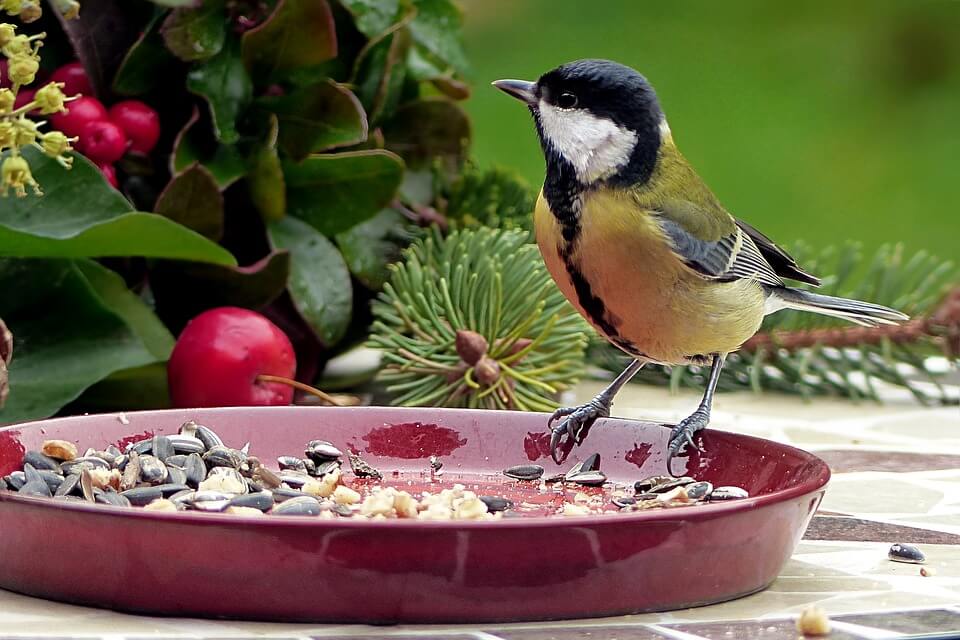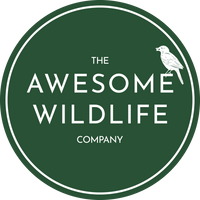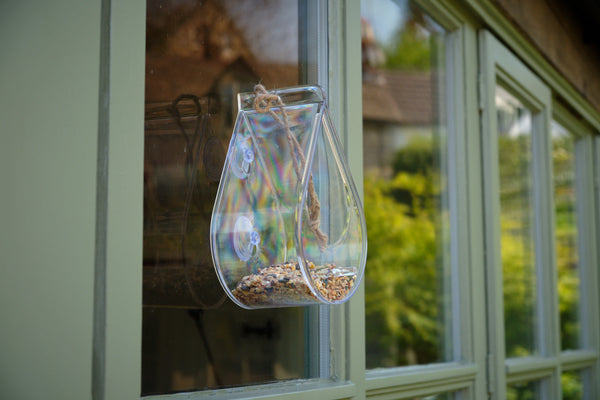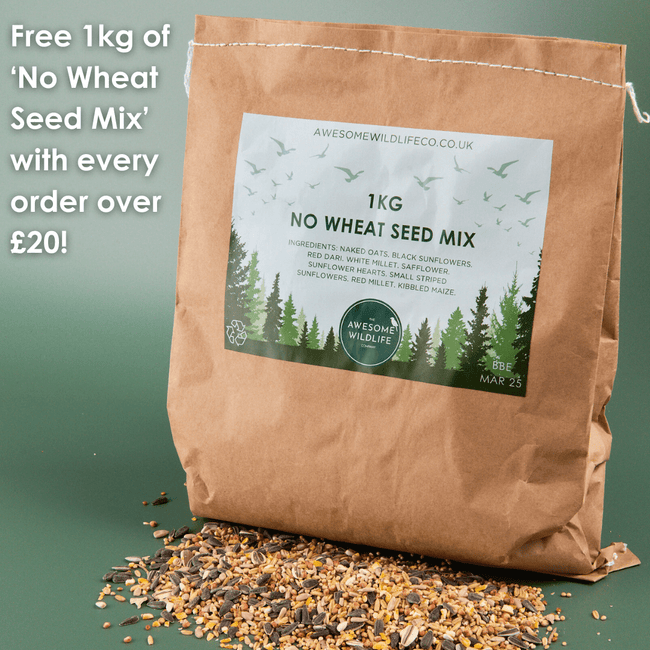What Not to Feed Wild Birds - Top Tips
Understanding what not to feed wild birds is one of the most important steps to ensuring that you're feeding wild birds the right things. To feed wild birds better, we've put together a short article to share with you - together, we'll make sure that garden birds get fed!

Garden birds
Garden birds are, of course, wild birds. Therefore, when we're considering what not to feed wild birds, we should ask what not to need to garden birds.
Interestingly, one of the main problems when feeding wild birds in your garden is not the things that they're fed: they're often quite resilient to the food they don't enjoy.
Rather, when feeding birds in your garden, they can tend to eat too much.

Knowing that birds eat bread is very basic knowledge, but a number of studies have shown that they can eat large amounts of it without actually taking on board any forms of nutrients or vitamins.
Bird table

It's tricky to know what not to feed wild birds when you're offering food to feed wild birds by way of your bird tables. Wild birds will happily land there and eat through whatever you've offered them, regardless of what it is.
As a common rule of thumb for a bird table, it's unwise to feed birds things that might stick to your bird table, or otherwise leave some form of residue.
A great example of this would be food with a lot of fat or sugar in it.
Feeding birds such rich food as those options can only be bad for them: the intense potency of the food will lead to a bird that's a little unwell.
They have quite short digestive systems, and so cannot properly digest a number of items.

What food is toxic to birds?
There are quite a number of different foods that are a little toxic to birds. To be sure that you feed birds in your local area only items that will turn out to be quite good for them, we've made up a short list here.

Desiccated coconut
Desiccated coconut is actually bad for the same reason that rice is bad for birds. The grains (or shavings of coconut) are dried out as part of their production.
When you eat them, they grow just a little in your stomach, which we can handle quite well.
Since birds have smaller stomachs, the transition from dry to fresh coconut can be quite bad for them indeed, with desiccated coconut sometimes killing birds.
Mouldy food
Mouldy or spoiled foods are bad for birds for much the same reasons that they might be bad for you or me.
They contain a number of different contaminants and bacteria that make them very poor bird food, and so you should avoid feeding them to birds.

On most lists of what not to feed wild birds, it's common for mouldy food not to come up, since it's a simple thing that most people would throw out.
If you've been offering spoiled food to birds, though, you've likely been doing them something of a disservice.
Cooking fats
Cooking fats can also be very bad for the digestive system of visiting birds. The reason for this is actually a little odd.
Human stomachs are some of the only stomachs that are adapted to manage quite a bit of fat in our diet, the majority of other animals can't quite manage it.

With the exception of fat balls, you should always avoid feeding fat balls to our feathered friends - they can get quite sick, and too much fat can even kill birds.
Fruit with seeds
While birds do adore seeds in the right foods, you shouldn't offer seeds to a bird if they're still within the fruit that they grew in.

Seeds that you buy and fill a bird feeder with have been dried and processed to ensure they're safe.
Seeds fresh from the fruit present something of a choking hazard to birds, simply because wild birds are quite small.
Onions
Just as you cannot feed birds bread, you cannot offer birds onions. The reason for this is that onions have quite a high sulfur content, while the majority of bird food absolutely doesn't. While a human stomach can deal with a small amount of sulfur, a bird stomach cannot.
On top of this, onions contain very little nutritional value for a bird, so even if the birds could eat them, it perhaps wouldn't be a great choice for stocking up your bird feeders.


Salty food
Salty foods can be bad for birds in the same way that they tend to be bad for humans. Too much salt in your diet can interfere with the proper functioning of your heart, leading to a fairly unhealthy body.
Since natural food and animal foods in the wild don't contain a lot of salt, birds aren't adapted to eat it. Therefore, you should avoid offering saltier food options to birds.
What should you never feed a bird?
The main things that shouldn't be fed to birds are items that can expand in contact with water. A great example of this is grains of rice, or oats (even cooked oats!). These items will tend to expand a little in the stomach of the bird, which is something the bird cannot handle. In time, it's liable to make them quite sick.
What is the best thing to feed a wild bird?
Sunflower seeds are a great choice for most people, since the seeds are affordable and plentiful, and can easily be digested by most birds. For larger birds, you can put out wet cat food, which may attract larger crows and ravens with time. A slightly more expensive option are sunflower hearts which are great for Blue Tits, Robins and House Sparrows. They can be used in a separate bird feeder.
During the breeding season, we would generally recommend offering birds protein-rich options like seeds and mealworms. These will provide a lot of energy in small parcels, making the feeding process a little more streamlined.
What can you not feed wild birds UK?

There are quite a number of things that spring to mind when considering what not to feed wild birds in the UK. The main option that's quite bad for the birds is fruit seeds - these are typically too large and tough for the birds to break down properly.
Also, while you can feed bread to wild birds, it's not recommended: it swells in their stomach and contains very little nutritional value, leading to a final meal that's both unsatisfying and has the possibility to make a bird quite sick.
We hope that this article has filled you in on a few odds and ends to bear in mind when feeding wild birds. They're beautiful creatures, so lets make sure that we feed them well and keep them with us!










